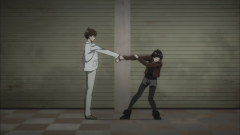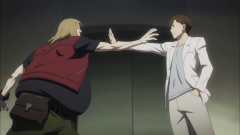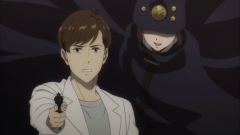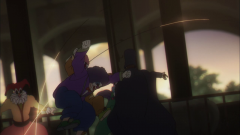Boogiepop never makes things easy huh? Just at the end of this Imaginator arc we immediately receive the whole 4-episode OVA of the next one. Before we get into the next arc (which I will cover in its entirety in the next post), this Imaginator arc reaches its conclusion. I remain half-half on how I perceive this arc as a whole. On one hand, it ends conclusively. Everything falls neatly into its place and every characters have their own significance to the story. One the other hand, the art of telling nonlinear puzzle-like structure like this one is that it adds up at the end, both emotionally and thematically, in which I can only consider Boogiepop mildy succeed at (in cinema world, Atom Egoyan is the master of this approach). Maybe part of that is because I wasn’t that invested to Masaki – Orihata dynamic, and another part is that the main characters don’t really involved into the narrative. Sure, Boogiepop pops in and steals the spotlight in the climax, but it has more to do with her being afraid that her friend Suema would get involved. That bit alone is essential, however. Despite her claims that she’s mostly a watcher, Boogiepop does care for her friends and will actively bang in if there’s any risk included.
Jin Asukai takes up the main narrative in episode 8 where he mostly reveals his own cards. When get confronted by Suema (about Kinukawa’s feeling), he talks about his ambition, pretentiously so, of changing the world. He does have something in mind as he meets Spooky E and totally outclasses him. It’s interesting to note that they have the same kind of power: Spooky E for brain-washing, and Jin for heart-altering (or whatever that is, you could say breast-touching and I’m not going to argue against), but what differentiate their power is the mean: Spooky E uses it purely for manipulation, whereas Jin’s method is something more substantial. It remains unclear to me, however, how does he know about Orihata’s perfect rose? I might miss some details but does he know Orihata in the first place, or is she just someone he coincidentally meet. It remains clear within the last two episodes that he’s much more dangerous and harder to deal with than Spooky E. One thing he does right, however, is when he finally addresses his thought to his cousin Kinukawa, and by rejecting her wholeheartedly she snaps out of her current brainwash.
As for Masaki, although being manipulated by Orihata of becoming a fake Boogiepop to lure out the real one, when it comes to his feeling to Orihata he’s never two-minded about that. As the story goes, he is being ambushed by brainwashed Kinukawa and nearlygive her a finishing blow, if not by the intervention of his sister Nagi. Eventually, the real Boogiepop meets him and tells him the truth, and one I considered as the main theme of Boogiepop the series so far. Masaki knows that he’s being brainwashed and manipulated this whole time, so that explains his fixtation to Orihata because he’s brainwashed to do so. Now with this knowledge, what does his heart really want? The ending works well on that end, but one that I find a little predictable.
As for the Master Gardener, he thinks he’s in control but he makes one grave mistake, that the perfect flower he saw in Orihata is a fake, because Orihata isn’t human. With this reveal, I honestly don’t feel the need for Boogiepop to appear at all. Yes, she assures that she maintains the order, and that she will destroy anything that destruct the structure, but it feels a bit off to me where the arc starts with her against the true Imaginator and ends with her beating Jin, an Imaginator manipulator, and the inclusion of both Suema and Nagi feel superfluous at best. Well, at least things work out in the end.





I agree the Imaginator arc has its problems, but compared to the first arc I think the show has improved immensely. The first arc was honestly a bit of a mess, introducing way too many characters in very little time without properly characterizing them (and getting us invested in them), and it made things needlessly confusing by messing with the chronology too. But this arc took its time with the characters, properly explaining what drives each of them, and although the story obviously had its fair share of mysteries it was never needlessly obtuse (I actually found the story pretty easy to follow all things considered), and everything came together nicely in the climax. It isn’t a masterpiece or anything, but at least I don’t feel like I’m wasting my time with it anymore.
As for Boogiepop, I didn’t really mind their absence from the narrative. Their role in the series mostly seems to be that of a puppeteer who directs the movements of the arc’s protagonists from the shadows, and only becomes directly involved when their presence is necessary. So it would be strange for them (god, using these gender neutral pronouns is awkward) to be at the center of the story. I am a bit annoyed by the lack of development for Touka, though. The OP hints at this major arc where Touka learns to embrace her alter ego or something, but so far she has basically been irrelevant to the story. Other than being the host of Boogiepop, we know almost nothing about her, and the story has done nothing to warm the audience up to her. Maybe the final arc will remedy this, but that the supposed main character is so utterly forgettable is – though not exactly rare in anime – rather disappointing.